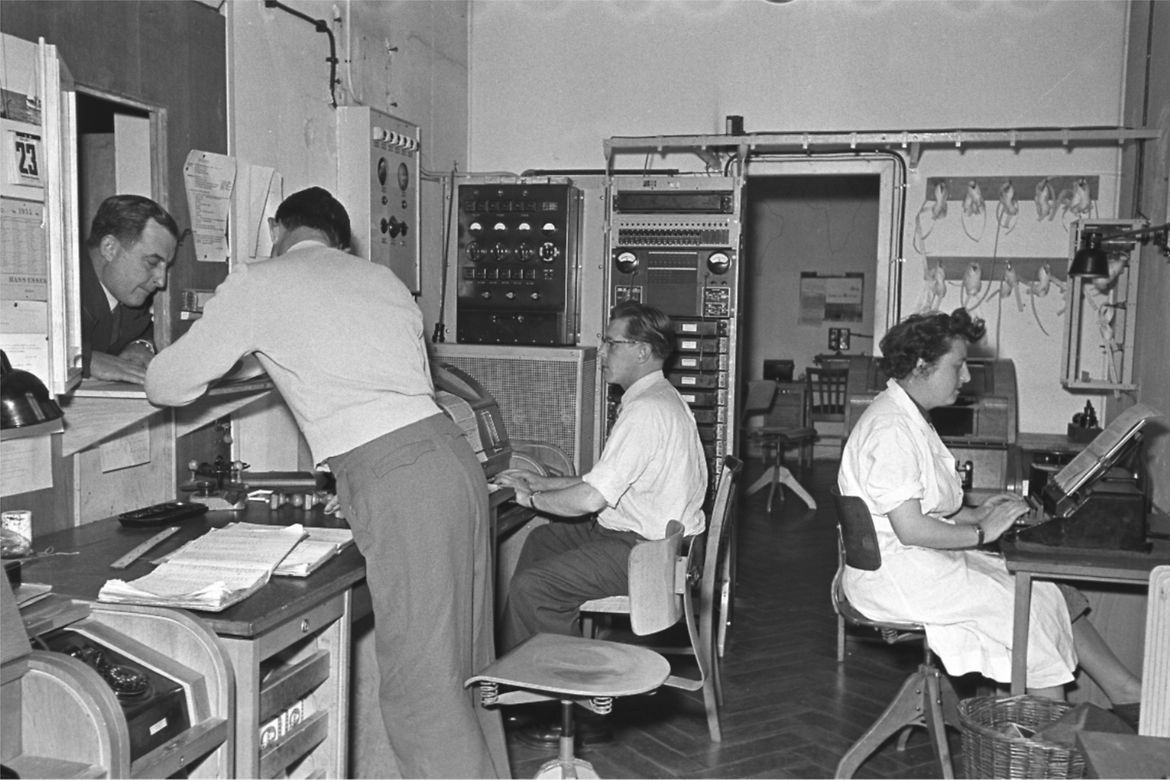Overview
The Press and Information Office provides information for citizens and the media about the work of the Federal Government. It also keeps the Federal Government informed of the news situation.
7 min reading time

The Federal Press Office fulfils two essential tasks: it provides information on the work of the Federal Government to the outside world, while at the same time working internally to keep the Federal Government employees up-to-date on current developments.
Photo: Stefan Müller
On 15 September 1949, the Bundestag elected Konrad Adenauer as the first Chancellor of the Federal Republic of Germany. One day later, Adenauer established the Federal Chancellery as the “office of the Federal Government”. It was also the founding day of the Press and Information Office of the Federal Government (Federal Press Office).
Since September 2018, the Press and Information Office of the Federal Government has also provided a summary of its role and responsibilities in a mission statement entitled “Keeping everyone well informed – citizens, government and media”.
The Federal Press Office from 1949 to the present
A brief review: After the experience of the infamous Reich Propaganda Ministry under the totalitarian Nazi regime, the first Federal Government established the Federal Press Office based on the structures of the Weimar Republic.
Adenauer did not just want a press office at the Chancellery: he wanted to set up an independent body. To this day, the head of the Federal Government's Press and Information Office reports directly to the Federal Chancellor.
The shorter designation “Federal Press Office” is frequently used when referring to the Press and Information Office of the Federal Government, but this can be somewhat misleading: the Federal Press Office does not regulate the press, let alone supervise it. Such an authority does not exist in Germany. Germany has a free press and there is no censorship (Article 5(1) (2) and (3) of the Basic Law). The Federal Government's Press and Information Office is a service provider for citizens, the media, and government.
The unification of Germany in 1990 confronted the Federal Press Office with new challenges: public information – one of the Office’s core responsibilities – was particularly in demand among people in the new federal states. In addition, large parts of the Federal Government were relocated to Berlin: in 1991, the Bundestag voted for the capital to be the seat of government.
The Bonn-Berlin Act determined which sections of which federal ministries were to move to Berlin. Today, approximately 490 staff work in Berlin, while around 50 are still based at the old headquarters in Bonn. There is a total of some 540 people employed at the two offices. (Last revised: September 2023)
Role and responsibilities
The Federal Press Office fulfils two essential tasks: it provides information on the work of the Federal Government to the outside world, while at the same time working internally to keep the Federal Government employees up-to-date on current developments.
Externally, the Federal Press Office provides citizens and the media with information about the Federal Government's policies – measures, laws, strategies and the background to policy.
Freedom of opinion and judgement require information and expertise. Anyone wanting to get involved in policy and decision-making processes needs to know about what is going on in politics.
Internally, the Office provides the Federal Government, the Federal Chancellor, the Federal President and their staff with information about current affairs in Germany and the world. Various sources are analysed for this purpose, including current national and international news tickers and newspapers. The information is then relayed via personal briefings and also by means of a continuous feed via text message and e-mail.
Comprehensive and reliable information about developments in Germany and abroad is crucial for appropriate, responsible political decisions and government strategies.
The public
The government updates the information it provides to citizens on a daily basis. The Press and Information Office shares information on Federal Government policy every day on the websites www.bundesregierung.de and www.bundeskanzler.de. In addition to this, users can download photo series, speeches and interviews, watch live streams from the Chancellery and access press releases.
Federal Chancellor Olaf Scholz regularly reports on his policies, political positions and important appointments on “X” (@bundeskanzler) and Instagram (@bundeskanzler).
Government spokesperson Steffen Hebestreit provides information on the current work of the government on “X” at @RegSprecher.
Facebook users can access photos, images and videos about the work of the Federal Government on its Facebook page, @Bundesregierung. The Instagram page @Bundesregierung is particularly aimed at younger citizens. Here government policy is vividly conveyed by means of graphics, videos, stories and interactive elements. These two pages also act as dialogue platforms where users can ask questions, make suggestions and express their opinions.
On the platform Mastodon the Federal Press Office provides information on the work of the Federal Government on the channel @Bundesregierung@social.bund.de.
In addition to this, citizens can access information on key issues of government policy in a wide range of brochures, handbooks and leaflets. This information is also increasingly available online, ensuring it is kept as up-to-date as possible. Some handbooks are aimed at specific groups, such as young people, employees, and pensioners.
Another aspect of the Press and Information Office’s work is the planning and funding of political fact-finding trips. These allow Members of the German Bundestag to invite up to three groups from their constituencies to come to Berlin each year. At up to 50 participants per group, and 2,000 such groups each year, this adds up to around 100,000 citizens. In addition to talks with representatives of the Bundestag, the programme for these visits always includes appointments at the Chancellery, the Press and Information Office and government ministries. The fact-finding trips also take visitors to museums and memorials to recent German history.
The media
The media have a vital role to play in any democracy: they are mediators between the government and the citizens.
Newspapers, radio and television provide citizens with information, thereby helping people to form their opinions. This is why it is important to keep the media fully informed of the government’s activities and plans. This is not only the right of the Federal Government, it is also its duty.
The Federal Government uses various instruments to meet its obligation to inform the media, including regular press briefings on topics of current political interest.
The Federal Press Conference (BPK) is an independent association of German parliamentary journalists. It invites the government spokesperson and the ministry spokespersons to hold a press briefing three times a week, where they answer the questions put to them by Berlin-based journalists.
Incidentally, the managing editor’s office of the Federal Press Office is the first point of contact for enquiries from journalists. The managing editor publishes press releases issued by the Federal Chancellor and the Federal Government,
as well as operating a special website for use by the media. In addition to daily news, this website provides access to background information, materials and documents on government policy.
The picture archive contains more than two million photographs of official events in Germany and abroad.
Internal communication
Through its NewsCenter, the Press and Information Office of the Federal Government keeps the Federal Chancellor, the Federal Government and the Federal President informed of current news and key political events. The situation centre at the Federal Press Office analyses major news agency reports on a round-the-clock basis. The NewsCenter was established in December 2021 to replace the previous systems for informing the Federal Government of the media situation, thereby laying the basis for innovative and future-oriented press and media analysis and effective briefing.
The NewsCenter analyses reports published by the news agencies, the major daily and weekly newspapers and the leading magazines in Germany and abroad as well as online news, providing an editorial summary on a digital cross-media dashboard. Other sources include the very latest political broadcasts on radio and television as well as the news put out by important online publishing portals, social media accounts and selected blogs. Once a day, the NewsCenter also publishes a digital press folder for the Federal Chancellor, the Federal President and the Minister of State for Culture and Media.
In order to ensure information is available on all important topics in retrospect, too, the press archive contains some 1,900 current titles of German and foreign publications. It has historical microfilm holdings of press material dating back to the year 1796.
The Press and Information Office of the Federal Government also analyses politically relevant information on websites that are not linked to existing print or media products. These include expert blogs and journalistic websites, for example.
























